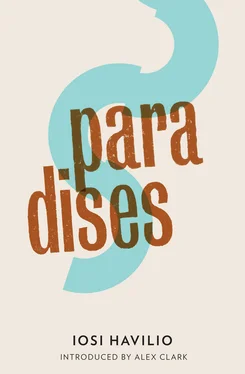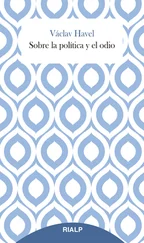Iosi Havilio - Paradises
Здесь есть возможность читать онлайн «Iosi Havilio - Paradises» весь текст электронной книги совершенно бесплатно (целиком полную версию без сокращений). В некоторых случаях можно слушать аудио, скачать через торрент в формате fb2 и присутствует краткое содержание. Год выпуска: 2013, Издательство: And Other Stories, Жанр: Современная проза, на английском языке. Описание произведения, (предисловие) а так же отзывы посетителей доступны на портале библиотеки ЛибКат.
- Название:Paradises
- Автор:
- Издательство:And Other Stories
- Жанр:
- Год:2013
- ISBN:нет данных
- Рейтинг книги:3 / 5. Голосов: 1
-
Избранное:Добавить в избранное
- Отзывы:
-
Ваша оценка:
- 60
- 1
- 2
- 3
- 4
- 5
Paradises: краткое содержание, описание и аннотация
Предлагаем к чтению аннотацию, описание, краткое содержание или предисловие (зависит от того, что написал сам автор книги «Paradises»). Если вы не нашли необходимую информацию о книге — напишите в комментариях, мы постараемся отыскать её.
is an almost perfect novel." — Albert Camus's
reimagined with a female lead in in twenty-first-century Buenos Aires.
Recently widowed, a young woman leaves the countryside for Buenos Aires with her four-year-old son where she seeks to build a new life for herself. She finds work in the zoo and moves into the human zoo of a squatted tower block at the invitation of one of its residents, to whom she acts as nurse, giving morphine injections.
Paradises — читать онлайн бесплатно полную книгу (весь текст) целиком
Ниже представлен текст книги, разбитый по страницам. Система сохранения места последней прочитанной страницы, позволяет с удобством читать онлайн бесплатно книгу «Paradises», без необходимости каждый раз заново искать на чём Вы остановились. Поставьте закладку, и сможете в любой момент перейти на страницу, на которой закончили чтение.
Интервал:
Закладка:
CHURCH OF THE KING OF KINGS
The Helmet of Salvation
I take a flyer without stopping. Meeting timetable: Tuesday, Thursday and Friday, from 5pm to 9pm. Wednesdays, 9.30am: path to the sacrament of confirmation. On the way back to the hotel, we stop at a kiosk. Actually, it’s Simón who stops, captivated by a window at ground level, his eyes glued to a plastic cat on a motorbike complete with sidecar, somewhere between a piece of junk and an antique. I decide that all this upheaval deserves some kind of reward, so I knock on the window and a man with nicotine-stained teeth and several days’ growth of white stubble pulls back the window reluctantly. A cold, dry wind hits my face; the man prefers his air conditioning to making contact with the outside world. How much is it? I ask, pointing at the cat. The old man deflects my question with his eyebrows, as if I had said something absurd. I insist: The price. He still doesn’t respond, he shuts himself back into his winter, examines the toy all over in search of a label and shakes his head. He opens the window again. I don’t know, and he says to Simón: Do you like it? Simón grabs on to my leg, embarrassed, but still nodding firmly and clearly to say yes. Take it, the man says to me, give me whatever you think, and he extends his trembling arm with the motorcyclist cat, which could end up on the floor at any moment. For that reason, to prevent it from falling, even though I’m not sure about having to decide the price myself, I take it. From my pocket, I remove a five-peso note, screwed into a ball, reshape it and venture: Is that all right? From the expression on his face, it would appear the old man had something else in mind; to make up for it, I buy a packet of coconut biscuits. Back at the hotel, I throw myself face-down on the bed. Almost a siesta. Simón entertains himself playing with the motorcycling cat, along my legs, my back, my head, as if they were mountain paths. My body feels large, aching and damp, nails scratching at my skin, my neck stiff, my arse wet. I stay like that for a good while, abandoned, until Simón falls asleep at my feet. I turn over and prolong the lethargy imagining countries in the cracks on the ceiling.
It’s still daylight when I go out into the courtyard. The kitchen clock is showing half eight. At first glance: pots, pans and dishes hanging up and a series of pizza trays and cake tins balanced on a low unit with a worktop and loose doors. In the fridge, everything is identified with tape, names written in thick marker pen, coloured plastic containers. Matilde, it says on a pat of butter, some eggs and a plastic bag containing minced meat or lentils, something dark and small. There’s also a packet of gnocchi, a sachet of tomato sauce and a bottle of tonic water labelled Raúl. The red containers have a ‘2’ or a ‘z’ in black on the front and on the lid. The doors of the cupboard are covered with mosquito nets, like in the country. There’s enough food to cope with a siege: lots of packets of noodles, polenta and flour, several piles of tins.
Halfway through my inspection a man walks in — he is heavyset and stooped, not from age but from chronic bad posture, perhaps a labourer or docker — and greets me with a polite and friendly hello. He opens the fridge, takes out a bottle of tonic water and I realise that he is Raúl, unless someone else shares his things. I sit down at the table and think about some food for the evening. Voices, growing as they approach and weakening as they move away, and a baby’s cries create a din I’m unaccustomed to. Everything went so fast, when barely anything happened for so long.
Suddenly, the Spaniard’s voice erupts like a whirlwind: The little boy’s crying, she says in a reproachful tone as if I had hidden something from her when I arrived. I hold my hands out in front of me, excusing myself, get up and walk the ten steps separating me from the courtyard where Simón is, barefoot, with a dizzy expression. I walk over to him, hug him and realise the woman has followed me and is now observing me from the door, contorting her mouth, eyes like eggs, waiting for an explanation I’m not about to give. It’s all fine, I say in Simón’s ear. In the room I ask him whether he had a bad dream. He shakes his head. Pee, he says, and it doesn’t take me long to realise that his trousers and back are wet with urine. After changing him, we stay in the room for a long time, me, stroking his back, him, gradually calming down after his fright. I wonder whether he’s got it into his head I might abandon him.
Later, in the kitchen, as I’m preparing some rice I brought from the house, I meet a Romanian woman of around my age, with very blue, alarmed-looking eyes, a broad back, from rowing or swimming, a violently uneven fringe. Initially she doesn’t speak, she does everything stealthily, ignoring me, unfriendly, or maybe just shy. She lights a ring on the hob, fills a pan with water and leaves.
When she reappears, I tell her I lowered the heat because the water was boiling. Ah, she says, and throws in the two sausages remaining in the pack. She looks at me suspiciously, side-on, almost with contempt, wrinkling her nostrils as if I smell bad or she’s about to attack me. She gives the impression she doesn’t want anything to do with anyone. Just in case, I venture no further than hello. In a while, it’s she who looks for an excuse to move closer and strike up a conversation. Have you got the time? is the first thing she asks. I’m about to guess at nine o’clock, but I raise my eyes and gesture at the clock over the fridge: quarter to ten. And then: Mayonnaise? I don’t have any, I apologise with a tight smile. We only arrived a few hours ago. Where from, she wants to know. The country, I say, and she nods mutely, several times, as if the word country inspired respect or solved some mystery. And you, I ask. She says she’s from a small village. Transylvania, her voice darkens, she grits her teeth, pulling a monster face, suddenly funny. Returning to her own voice, she tells me that it must be two years already since she arrived in this country. It’s good here, she concludes with a shrug. She asks me whether I work, I tell her not yet, that I’m going to start looking. She stays quiet, her mouth slightly open, as if about to blow out a candle, which only reinforces that air of permanent surprise in her eyes, somewhere between fright and fascination. She says she spent about a year selling coffee on the street from a little cart that she still has in her room — they never came to claim it back. And she can’t remember the location of the warehouse to return it herself. She explains how the business works, she talks about rents and percentages. Because she struggled with the language at first, she operated with gestures and photos stuck to the cart: coffee, croissants, sandwiches, even soup. It’s good work, she says. No boss and out in the fresh air.
We eat our rice. She munches standing up, with a sour expression, eyes on the pan. I invite her to sit at the table. She doesn’t hesitate. She pricks her remaining sausage with a fork and approaches. She tells me her story in snippets, getting tied in knots by her tongue and the past. Her mother died in childbirth, or shortly after she was born, I’m not sure which, her father left her in her grandmother’s care until the age of twelve, after which he took her to live with him in Bucharest. At school she met Draco, her boyfriend, who convinced her to come here. They lived in guesthouses for a year. In several neighbourhoods, she says. He got involved in a business with an uncle who already lived in Buenos Aires, importing tyres from India, but it failed, they never got the money, and she had to work the taxi ranks with her cart. Yuri, Draco’s uncle, lives with his wife in a hotel full of transvestites in Constitución, she says, and purses all her features as if there were a rotten smell. At the racecourse, Draco met a guy who tricked him into buying half a horse that didn’t exist. Very bad, she says. They split up. He decided to go to the south to try his luck: He likes mountains. She preferred to stay: I was already too cold.
Читать дальшеИнтервал:
Закладка:
Похожие книги на «Paradises»
Представляем Вашему вниманию похожие книги на «Paradises» списком для выбора. Мы отобрали схожую по названию и смыслу литературу в надежде предоставить читателям больше вариантов отыскать новые, интересные, ещё непрочитанные произведения.
Обсуждение, отзывы о книге «Paradises» и просто собственные мнения читателей. Оставьте ваши комментарии, напишите, что Вы думаете о произведении, его смысле или главных героях. Укажите что конкретно понравилось, а что нет, и почему Вы так считаете.











